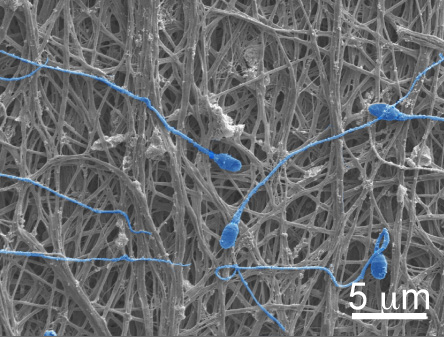 |
| The electrospun fibers can physically block sperm, as shown here.--Courtesy of Kim Woodrow, UW |
In research released a few days before World AIDS Day, University of Washington researchers have created a stretchy, electrically spun fabric that could provide a hidden protection against HIV infection and pregnancy, allowing women to protect their own health discreetly.
Condoms, used properly, are an excellent method of birth control and of preventing sexually transmitted infections, but they can be awkward to use and may not be permissible in some cultures or religious groups. The researchers have created a fabric woven from electrically spun fibers that dissolve to release drugs, which could be used as a vaginal insert, releasing drugs within minutes or over a few days, for example as a coating for a vaginal ring. It can also block sperm, just like a condom or diaphragm does. The research is published in PLoS One.
The spinning process is very high-tech. An electric field hurls a charged jet of fluid through the air, where it forms a fine thread between 100 and several thousand nanometers thick. (A human hair is around 50,000 nanometers thick.) As they fall onto a hard surface, they form a mesh shaped to the surface, such as a sheet or a ring. Altering the thread alters how strong the fabric is, or how well it dissolves.
The stretchy fabric can deliver more than one drug at a time, including small-molecule drugs, proteins and antibodies, protecting against a range of sexually transmitted diseases or delivering a number of anti-HIV drugs to avoid the development of resistance.
"Our dream is to create a product women can use to protect themselves from HIV infection and unintended pregnancy," Kim Woodrow of the University of Washington said in a press release. "We have the drugs to do that. It's really about delivering them in a way that makes them more potent, and allows a woman to want to use it."
The research is supported by a grant of almost $1 million from the Bill & Melinda Gates Foundation, which will fund the growth of the team, studies of different combinations of anti-HIV drugs and a hormonal contraceptive, and scale-up of a lead combination. The initial focus is on Africa, but it could have potential in the developed world as well.
The fabric seems to be effective, and its effects are reversible, but it remains to be seen whether it could be cheap enough for disease- and pregnancy prevention in developing countries, and whether women will choose it as an option. As co-author Emily Krogstad said in a release: "At the time of sex, are people going to actually use it? That's where having multiple options really comes into play."
- read the press release
- see the paper